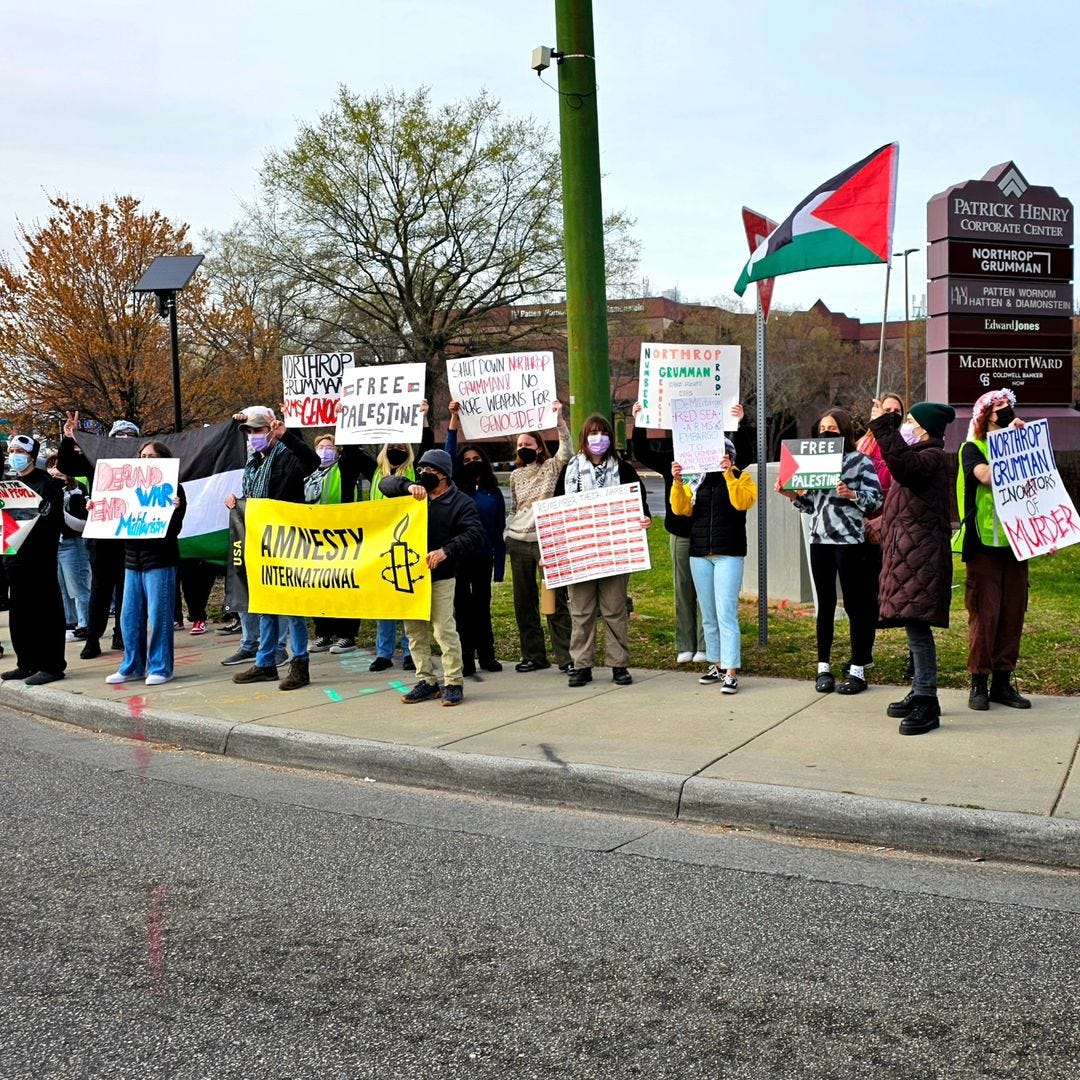Watermelon Shirt at Northrop Grumman? Inside Gaza Dissent at Weapons Plants
At companies that make weapons for Israel, employees opposed to Gaza war told Inkstick what they hear in the workplace: “If I could do anything now, I’d be protesting in Washington.”
Hi,
Today I have a new story out sharing some extraordinary snippets about Gaza dissent inside some of the most secretive workplaces in America — weapons plants.
The story is, essentially, one about political speech in the workplace. The TL;DR on that is: At-will employment is the default for the vast majority of private sector American workers who are not in labor unions or in places with exceptional local laws, like Montana. That means that workers can be fired for nearly any reason, including for something they said — including something about Israel or Gaza. “The freedom of speech that so many Americans valorize is in practical effect illusory for many American workers,” University of Minnesota law professor Charlotte Garden wrote for the Economic Policy Institute.
That includes workers building what President Biden likes to dub the “arsenal of democracy.”
Courtesy of Dissenters/ St. Louis Palestine Solidarity Committee
A Northrop Grumman engineer told me that their operations manager confided in them that he took “comfort” in the fact that their specific building did not make weapons for Israel. (The manager works on the Trident missile, which delivers nuclear warheads from ballistic missile submarines.) The engineer told Inkstick, however, that other buildings at their worksite make parts for the F-35, a fighter jet that Israel uses to bomb Gaza.
At a routine meeting a few months ago, a program manager for the Trident looked “distressed,” the engineer recalled. She told her coworkers, “If I could do anything right now, I’d be protesting in Washington, DC.”
The manager’s son was in the military, and Biden had just announced that the United States was building a pier to deliver humanitarian aid to the strip. The manager feared that the pier could mean American boots on the ground there. “She was furious and scared that her son would be deployed to Gaza,” the engineer told Inkstick.
The engineer wondered if they’d face repercussions if they indicated their support for Palestinian rights on the job. “What if I did something really simple like wear a watermelon shirt?”
Courtesy of Dissenters – College of William & Mary
Elsewhere, at a unionized Boeing plant, one worker told me he wanted to read a statement put out by the executive council of the International Association of Machinists and Aerospace Workers, the largest union in the defense industry, to his Boeing coworkers at a general body meeting. The statement did not use the word “ceasefire” but said that the “senseless” conflict “must end now.”
One union leader snapped at him when he asked for permission to do so. “The Bible gave that land to the Israelites, and the Palestinians have no right to that!” Another asked what the union’s role was in the war. “What are we going to do about it? Pass a resolution telling Netanyahu to stop?”
The worker told me there were more concrete things his union could have done — his coworkers are making rush weapons shipments to Israel, seeing the destination country on packing materials.
His obstacle in the workplace isn’t really fear of getting fired, since unionized employees have access to a grievance process to challenge terminations and discipline. His issue, he told me, was the political bent of his workforce.
Labor leaders “look at the membership and see that it’s very conservative and think, ‘There’s only so far I can pull on this leash before it breaks,’” he said.
Read more about their stories in our latest piece: “Workers at Defense Contractors Navigate Gaza Dissent.”
Extra: Georgia local elections
I watched the results of the local elections two weeks ago here in Georgia with interest, especially as they related to our state’s largest military contractor, Lockheed Martin, and the war on Gaza. North of Atlanta in Cobb County, democratic socialist Gabriel Sanchez beat out an incumbent who received campaign donations from Lockheed and lobbied for contracts favoring the company, with Sanchez winning 57% of the vote in the primary. Also in the north Atlanta suburbs, an incumbent state legislator, Sally Harrell, who had abstained on a vote to add antisemitism to Georgia’s hate crime law, saying that other groups are owed similar protections, staved off a challenge by the father of a slain IDF enlistee. David Lubin’s 20-year-old daughter, who moved to Israel after graduating high school in the north Atlanta suburb of Dunwoody, joined the IDF, was drafted into the border police, and was killed while on duty in November by a knife-wielding teenager in Jerusalem.
Masterclass
The British American Security Information Council invited me to give a masterclass to young national security policy professionals called: Eight Decades of the US Military-Industrial Complex: Trends in Domestic Job Creation, Working Conditions, and Organised Labour. It’s now online here. I actually had messed up the time zone conversion and barely hopped on the Zoom before it started — hence being a little disheveled.
ICYMI
Our deep dive into the Church of Jesus Christ of Latter-day Saints’ secretive investment manager, Ensign Peak, holding Northrop Grumman stock, in addition to other nuclear weapons contractors, is on the cover of the Salt Lake City Weekly. Read more here about “sin screens” and the Mormon church’s historic opposition to nukes.
Thank you for reading!
Thoughts, comments, story suggestions? Send them my way at tbarnes@inkstickmedia.com. We may publish them in a future newsletter.







